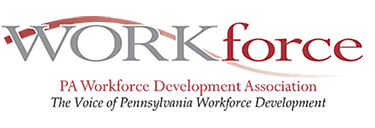This week, PWDA leadership traveled to Washington, DC, to talk with our Congressional delegation and administration members about workforce development needs in Pennsylvania.
We visited at a critical time for Pennsylvania. Our commonwealth faces a unique challenge: historically low unemployment rates that have left employers struggling to find skilled workers to fill their job openings. Recent data from the U.S. Bureau of Labor Statistics underscores this issue, revealing nearly two job openings for every unemployed worker in America.
Additionally, with the federal investments in infrastructure, energy, and manufacturing projects underway, we anticipate a significant surge in the demand for skilled workers in our state. These investments are projected to support millions of jobs annually, substantially benefiting Pennsylvania.
Luckily, workforce development is a bipartisan issue that has served as a bridge between parties. We were able to serve as the voice of the Pennsylvania workforce development system as we talked with our elected representatives and leaders in the Biden administration.
U.S. Congress: We met with House and Senate Committee members to discuss WIOA reauthorization. Our representatives must understand how the legislation is being implemented on the ground and how we believe it could be improved as they consider reauthorization. Several other issues emerged in our discussions, including the requirement for a physical one-stop shop for job seekers. We saw that preferences and technology changed during the pandemic, and some mandates could be loosened to provide more responsive and flexible services to job seekers.
We also mentioned the importance and need for secure access to UC Claimant information and new hire data to support job seekers. We stressed that timely data access will allow for better evaluation of workforce programs and policies and that the current aggregate data-sharing practices are ineffective. These concerns were also recently raised in our public comment submission to the Department of Labor.
We also discussed emerging ideas like short-term Pell Grants for certification and other programs under the 16-week minimum requirement for an educational program to qualify for a Pell Grant. With many new training and certification programs and a countrywide shift toward new types of credentialing, Congress must program flexibility for students, workers, and workforce partners so they can get the training they need. Lastly, we discussed with congressional staff the need for more flexibility and pathways to qualify Eligible Providers of Training Services. Again, the education and training models are changing, and we need to change.
White House We also met with the White House National Economic Council, where we talked about infrastructure investments and workforce progress with a focus on manufacturing, educators, truckers, and trades. The Economic Council was particularly interested in apprenticeship models and what we saw working in our communities. We were able to have a productive discussion about the regional workforce hub in Pittsburgh, which is one of only five hubs in the country. We all want to ensure that Pittsburgh and the entire commonwealth can take advantage of this opportunity and maximize the value of the regional hub for workers, job seekers, and businesses.
Communications Lastly, we summarized our requests in a letter to the Pennsylvania delegation. Unfortunately, over the past two decades, Congress has steadily reduced funding for critical workforce programs, leading to an ecosystem that struggles to meet the needs of Pennsylvania employers and workers today. Instead of continuing this trend, we urged them to allocate the necessary resources for Pennsylvania workers and the programs that are instrumental in their success as part of the federal fiscal year 2024 appropriations process and consider the following policies:
- Pass legislation that funds workforce programs for the 2024 fiscal year at levels no less than those proposed in the Senate appropriations bill for the Departments of Labor, Health and Human Services, Education, and related agencies.
- Provide dedicated resources to industry sector partnerships. Partnerships are a proven strategy to help employers within a region or industry identify workforce needs, provide training and supportive services that connect workers with in-demand jobs, and help to address barriers that cause inequities in the workplace.
- Include language that expands Pell grants to individuals entering short-term skills training and education programs. Pell grants are an essential tool to make education more affordable and accessible for those with the greatest need. Expanding Pell Grants to shorter programs will support workers’ ability to increase their skills and access good jobs quickly.
- Support grant programs that invest in building workers’ digital skills. There is an overwhelming demand for digital skills in the labor market as 92% of jobs require digital skills. Yet, only two-thirds of workers have the foundational digital skills necessary to enter and succeed in today’s jobs. Workers of color are disproportionately likely to face digital skills gaps due to longstanding inequities. Investments in programs that build digital skills will help prepare workers for existing and future jobs.
- Provide funding that allows higher education institutions to support career pathways, skills training and education, and supportive services to help meet workers where they are and support them as they move up or change industries throughout their careers.
We always appreciate the opportunity to visit with our Congressional delegation and other leaders in Washington. It’s an honor to carry the voice of our members and workforce partners, and we always want to make sure you are heard.
